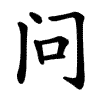问 wèn ask
Made up of [门 mén entrance; gate radical 169, 口 kǒu mouth radical 30]Similar looking characters : 间 jiàn (gap)
Alternative traditional form of character: 問
Made with 6 strokes.
A representation of a 'mouth' at a 'gateway' or entrance to a house suggesting a question asked in greeting
Related characters
Also uses 门 mén component: 间 jiàn (gap) 间 jiān (between) ; 们 mén (s) ; 闰 rùn (leap) ; 闻 wén (to hear) ; 闲 xián (to stay idle)
Also uses 口 kǒu component: 吧 bā (supposition or suggestion) 唱 chàng (to sing) ; 超 chāo (to exceed) ; 吃 chī (to eat) ; 船 chuán (boat) ; 啡 fēi (coffee) ; 富 fù (rich) ; 福 fú (good fortune) ; 告 gào (to tell) ; 各 gè (each) ; 宫 gōng (palace) ; 狗 gǒu (dog) ; 古 gǔ (ancient) ; 咳 hāi (sound of sighing) ; 号 hào (name) ; 和 hé (together) ; 合 hé (to close) ; 喝 hē (drink) ; 亨 hēng (prosperous) ; 后 hòu (behind) ; 回 huí (to circle) ; 或 huò (maybe) ; 吉 jí (lucky) ; 叫 jiào (called) ; 京 jīng (capital) ; 咎 jiù (fault) ; 句 jù (sentence) ; 局 jú (office) ; 君 jūn (monarch) ; 咖 kā (coffee) ; 可 kě (can) ; 另 lìng (other) ; 吗 mǎ (?) ; 命 mìng (life) ; 名 míng (name) ; 鸣 míng (to call (birds)) ; 呢 ne (and you?) ; 啤 pí (hops) ; 品 pǐn (article) ; 如 rú (as) ; 尚 shàng (still) ; 事 shì (matter) ; 史 shǐ (history) ; 虽 suī (although) ; 台 tái (typhoon) ; 唐 táng (Tang) ; 听 tīng (to listen) ; 同 tóng (same) ; 喜 xǐ (to be fond of) ; 兄 xiōng (elder brother) ; 咬 yǎo (to bite) ; 右 yòu (right) ; 语 yǔ (language) ; 员 yuán (person) ; 曰 yuē (to speak) ; 占 zhān (to observe) ; 只 zhī (one) ; 知 zhī (to know) ; 周 zhōu (circuit) ; 足 zú (foot)
Different tone
文 wén (script) ; 闻 wén (to hear)Pronunciation
Sound file kindly provided by shtooka.net ➚ under a Creative Commons Attribution Share Alike License

Stroke order for character 问, kindly provided under Wikimedia creative commons license ➚
Proverbs
不耻下问 bù chǐ xià wèn There is no shame in asking help from those less fortunate or senior than yourself.明知故问 míng zhī gù wèn To ask a question when already knowing the answer